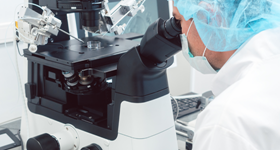Modernising pharma manufacturing with Industry 4.0

The dawn of Pharma 4.0 has brought about a precedence of smart manufacturing with AI, IoT and automation. Such technologies are increasingly prevalent and have become essential to the continued success and competitiveness of today’s global manufacturers.
From full visibility of operations to innovation of personalised medication, life sciences firms are gearing themselves up to meet the potential spike in demand for healthcare needs. This is also triggered by growing aging populations particularly in the Asian regions.
For the manufacturing sector in particular, let’s find out how it has revolutionised to meet the needs of patients today.
1. Increase productivity and profitability
Intense competition, higher production requirements, and a strict regulatory environment puts pressure on pharma manufacturers to optimise production. Speed is more important than ever to reach new emerging markets, compete with generics, and get the most out of products before their patents expire.
It is thus important to have an integrated control and information system which will build a connected enterprise. The ability to attain organisation-wide connectivity and visibility helps to align local operations with global requirements and improve efficiencies across plants.
Automation has thus brought about greater efficiency within production and manufacturing. This includes having lower production cycle times and improved manufacturing efficiency.
With real-time access and heightened visibility of vital manufacturing data, firms can now implement business process improvements and increase access to real-time production information. This would then have spill-over benefits which improves integration of supply chain across pharma facilities.
2. Improving product quality and optimising flexibility
To meet pharma industry challenges, firms also require a more agile and flexible manufacturing team. This includes the ability to adopt highly-integrated control and information solutions for greater productivity, increased efficiency, and lowered risks.
The pharmaceutical industry has seen the advent of personalised medication. This has brought the industry closer to more precise, predictable healthcare that is customised to the individual patient. With increased understanding of genetics, an increase number of doctors and specialists are able to provide better disease prevention, more accurate diagnoses, safer drug prescriptions and more effective treatments.
In order to manufacture personalised drugs, pharma factories no longer manufacture in big batches. This can be done through smart technologies that can provide the flexibility and precision manufacturing operations need. GSK, which has been manufacturing in Singapore for nearly 50 years, has been pioneering a technology called continuous manufacturing, instead of making products in batches which greatly optimises manufacturing processes. GSK’s continuous manufacturing gathers a lot of real-time data that the firm can use to quickly identify trends through certain condition changes. One is able to tell almost instantly what's going on in the plant – from whether the material being produced is acceptable, to whether flow rates are going the way they should be. All data would be available at their fingertips and indicative of the manufacturability or quality of the product and process.
With automation, personalised medication would be able to reach their full potential. Automation and around-the-clock processing allows for commercial viability of drugs. Without automation and robotics, scientists often become hampered by manual testing procedures. Today’s automated, high-throughput screening allows scientists to access a huge amount of data with minimal manual interaction. This keeps costs low and increases the speed at which the system can analyse gene sequences.
3. Spill-over benefits from harnessing big data
Computing makes it easier to connect machines and increases the ability to create organisation-wide data lakes. Machine-learning devices can also be used to run analytics in real time, physically close to the equipment while big data is analysed in the cloud. Big data in turn, allows for the creation of digital twins that turns data into valuable insights.
With this digital information available across multiple sites, batches and suppliers, sophisticated advanced analytics can provide a digital twin that best represents the golden batch and alert controllers to any problems that may arise based on these specific data sets.
As many products manufactured by pharmaceutical companies are sensitive to temperature changes, it’s necessary to distribute them through cold chain methods. To ensure accuracy and efficiency, Merck uses smart sensors in its shipments to monitor temperatures as products move through supply chains. It then informs the company if there is any signal to indicate temperatures outside of the optimal range. Eventually, they had 14 years’ worth of data that helped to identify the factors that may cause undesirable outcomes to happen.
However, the technologies of Industry 4.0 also have its constraints and limitations. A full conversion of pharma manufacturing processes can never happen overnight. Instead, what manufacturers need to take note of is the limitations and understanding of how they may work around them.
Being aware of limitations moving forward
The pace of development within pharma manufacturing varies geographically. Hence, in some instances, tech-savvy firms have to return to older manufacturing processes, or older and less efficient test methods to generate enough inventory for countries where changes have yet to be approved.
As a result, companies may spend additional resources running two different analytical methods for one product and for a longer period of time because of the time it takes to get changes approved globally.
To prepare itself domestically, Singapore has well-established biomedical hubs namely Biopolis and Tuas Biomedical Park which facilitate the cooperation between public sector research centres with private labs and pharmaceutical manufacturing and production. This prepares firms in Singapore to work together and function as a hub that companies in other regions can rely on. It also makes Singapore an enticing place for investments and a potential candidate for cross-border collaborations.
The pharma manufacturing and supply chain sector are undergoing great changes and to get updated on the latest industry trends, Real Life Sciences Singapore will be attending the much anticipated ISPE Singapore conference. The conference will also touch on similar topics and it will be held this August 2018. You may also visit our website at www.realstaffing.com for more industry related insights.




